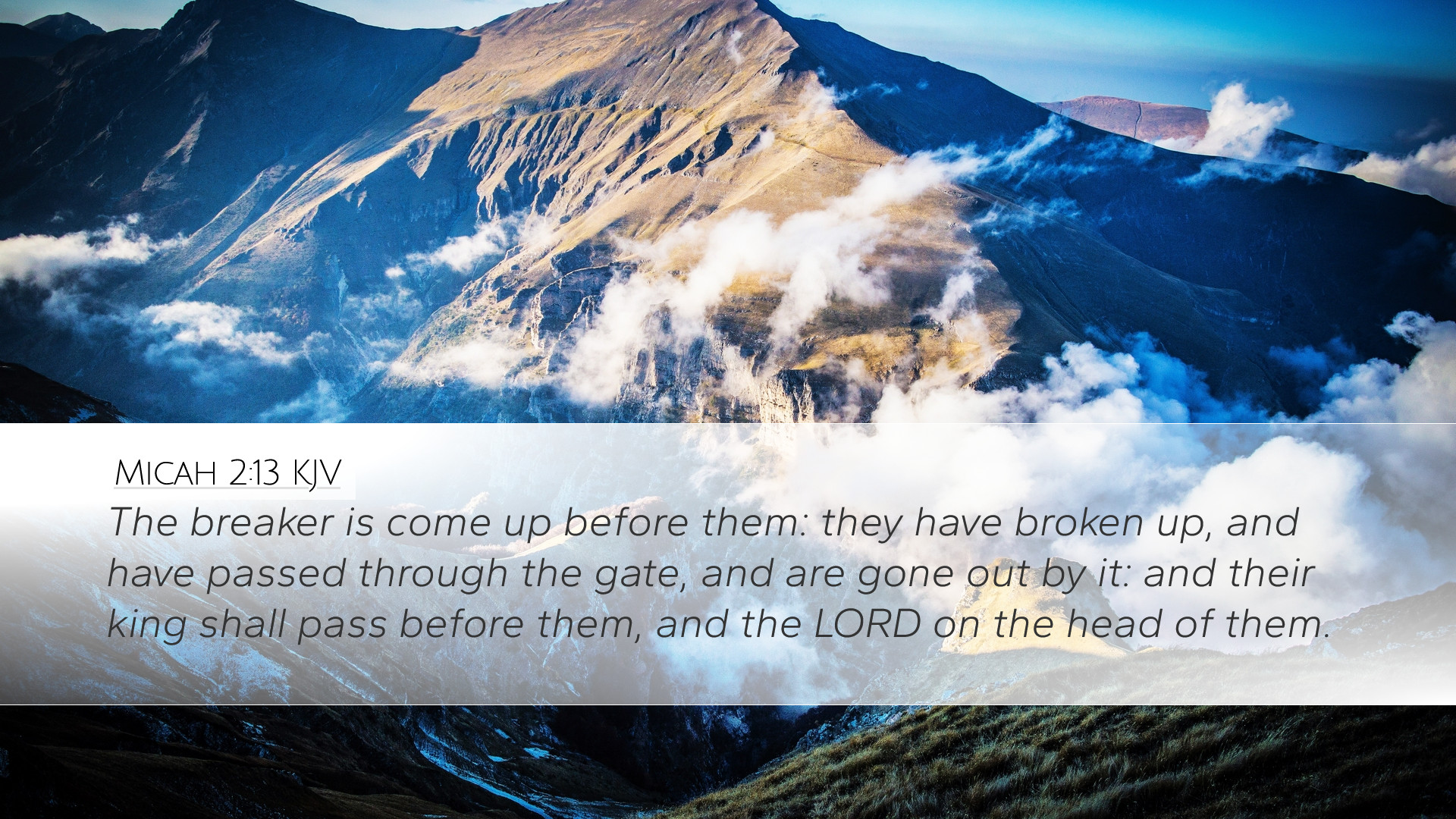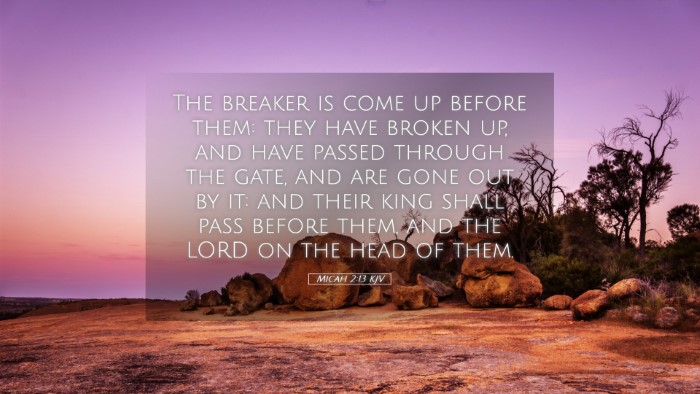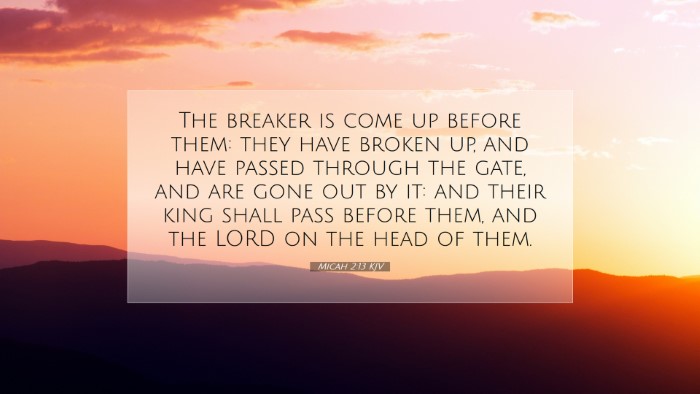Old Testament
Genesis Exodus Leviticus Numbers Deuteronomy Joshua Judges Ruth 1 Samuel 2 Samuel 1 Kings 2 Kings 1 Chronicles 2 Chronicles Ezra Nehemiah Esther Job Psalms Proverbs Ecclesiastes Song of Solomon Isaiah Jeremiah Lamentations Ezekiel Daniel Hosea Joel Amos Obadiah Jonah Micah Nahum Habakkuk Zephaniah Haggai Zechariah MalachiMicah 2:13
Micah 2:13 KJV
The breaker is come up before them: they have broken up, and have passed through the gate, and are gone out by it: and their king shall pass before them, and the LORD on the head of them.
Micah 2:13 Bible Commentary
Commentary on Micah 2:13
Verse Text: Micah 2:13: “The breaker is come up before them: they have broken up, and have passed through the gate, and are gone out by it: and their king shall pass before them, and the LORD on the head of them.”
Introduction
The prophetic message of Micah serves as a pivotal reminder of both judgment and hope within the context of Israel's history. In this verse, Micah speaks to the promise of restoration and liberation, focusing on the imagery of a "breaker" who leads God's people to freedom. This commentary draws from insights of Matthew Henry, Albert Barnes, and Adam Clarke, examining the intricacies of this verse and its theological implications for pastoral application and scholarly study.
Theological Insights
In Micah 2:13, the designation of the Lord as “the breaker” encapsulates the essence of divine intervention in the lives of the oppressed and downtrodden Israelites. This imagery suggests both strength and guidance, as God breaks through barriers to deliver His people.
1. The Breaker
Matthew Henry interprets the "breaker" as a metaphor for the Messiah, who comes to dismantle the oppressive systems in place. The term denotes not only a physical breaking of barriers but also indicates spiritual liberation. Henry emphasizes that this "Breaker" is none other than the Lord Himself, who goes before His people.
Similarly, Albert Barnes reinforces this interpretation, indicating that the term refers to Christ as the leader and liberator. The action of breaking through suggests that God initiates movements of freedom and restoration. This is further highlighted by the fact that the Lord will walk before His people, assuring them of His presence and guidance.
2. The Significance of the Gates
The imagery of "passing through the gate" is rich with symbolic meaning. Adam Clarke describes the gate as a significant threshold, representing not just a physical exit from oppression but also a passage into a promised future. The act of breaking through signifies God's commitment to liberate His people from both temporal and spiritual bondage.
Moreover, Henry notes that this exit represents a journey toward safety and restoration. The gates symbolize any hindrances that keep God's people from their intended purpose, be they sin, fear, or societal structures that oppress. The Lord's role as “the breaker” emphasizes that such barriers are no match for divine power.
Historical Context
Understanding Micah’s historical context is crucial. Written during a time of moral decay and social injustice in Israel, Micah’s prophecy served as a clarion call for repentance. Both Barnes and Clarke remark on the oppressive nature of the ruling class and the subsequent disenfranchisement of the poor, positioning the promise of the "breaker" as essential to the hope of the exiled and oppressed.
Micah speaks into a situation where the people felt lost, forsaken, and under judgment. By proclaiming the coming of the breaker, he reassures the faithful remnant that God’s promise of deliverance and restoration was still alive.
Christological Interpretation
From a Christological perspective, this verse serves as a foreshadowing of Christ as the ultimate "Breaker." Henry connects this to the New Testament, illustrating how Christ breaks the chains of sin and death.
This theme is echoed in the teachings of Jesus, where He states, “I am the way, the truth, and the life” (John 14:6), implying that through Him, believers find passage through the gates of despair and into the light of salvation.
Practical Applications for Today
For pastors and theologians today, Micah 2:13 serves as a profound reminder of God's transformative power in the face of adversity. This text offers several practical applications:
- Encouragement in Trials: Just as the Israelites were assured of God’s liberation, believers today can find comfort in the promise that God is actively involved in their struggles.
- Hope for the Oppressed: The declaration of the breaker provides a message that no societal system can inhibit God’s plan for justice and restoration, encouraging efforts in social justice and advocacy.
- Emphasis on Leadership: Christ as the leader emphasizes the need for godly leadership in the Church and communities, modeling after Christ who leads His followers through challenges.
Conclusion
Micah 2:13 powerfully encapsulates the themes of liberation, hope, and divine leadership. The reflections from Matthew Henry, Albert Barnes, and Adam Clarke highlight the multifaceted nature of God's promise through the understanding of the breaker. For contemporary audiences, this encourages a profound trust in God’s redemptive purposes amidst human fragility. As believers and scholars delve into this rich text, they are reminded that the same God who broke through the gates of oppression for Israel continues to break through the barriers that hinder spiritual and communal flourishing today.


